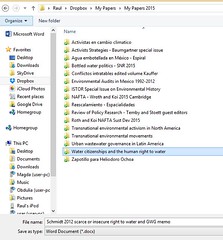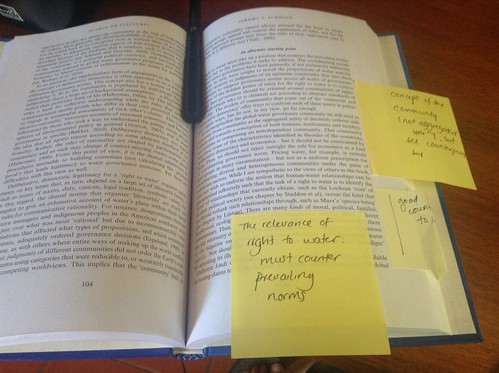A number of scholars have asked me what do I meant by a “reflective memo” in my previous post, so I figured I should probably post an example. This is a specific memo on a reading, and I will post a memo on my research and also an example of how to write fieldwork notes. I tend to be pretty obsessive when it comes to my research, and particularly when I write, because I know that whatever I read eventually will end up on one (or more) of my papers. To give just one example, the work of Oriol Mirosa on the human right to water has already been cited a few times in my publications.
For this particular example, I wrote a memo to myself summarizing Jeremy Schmidt‘s book chapter in Farhana Sultana and Alex Loftus’ edited volume on the right to water. The first thing I did was to read the book chapter. Since I don’t write on the margins of books, I attached sticky notes to places where I thought I had found something “quotable”, and/or a phrase that I wanted to engage further with (see photo below)
I then wrote a memo summarizing Jeremy’s chapter and then synthesizing how I reflected on it and compared it with other scholarship. Below is the actual text of my memo.
Schmidt, J. J. (2012). Scarce or insecure? The right to water and the ethics of global water governance. In F. Sultana & A. Loftus (Eds.), The right to water: Politics, governance and social struggles (pp. 94–109). London, UK and New York, USA: Earthscan.
Schmidt argues that while we (as scientists, an epistemic community) may agree that scarcity and security are two states of the current hydrological systems on planet Earth, these are primarily judgments, but these same arguments and agreed-upon ideas shape what we believe and how we approach policy solutions to solve global water governance problems.
“The right to water must take up a position that counters the prevailing norms that have led to the problems it seeks to address. The coordinating norms of global water governance have been primarily, if not exclusively utilitarian, and these, in turn, have sought to install the propositions of water scarcity and water security as judgments of an epistemic community that uses these propositions to support governance norms across all scales of governance. “(Schmidt 2012, p. 105)
Schmidt calls for a redefinition of community in such a way that we may overcome the problems that utilitarian governance presents us with.
Interestingly, Schmidt argues that pricing water may actually NOT be a bad idea and governance mechanism, but warns us against using it as a catch-all policy instrument. My view (RPV) is that Schmidt is right, and that’s perhaps one of the problems with operationalizing the human right to water properly – that we don’t actually know exactly how to use the right policy instruments because we are so obsessed with the notion of making water accessible to all (see Mirosa and Harris 2012, and Mirosa 2015, but also Gupta and Obani and my own work, Pacheco-Vega 2015 on bottled water).
One interesting and somewhat contrasting view of the idea that Schmidt is posing re: community is that of Risse (2013) who argues that we should conceptualize ourselves as the stewards of Earth and Earth’s resources and thus enacting and implementing the human right to water is an obligation that we all have (contrast with Schmidt’s view of community – doesn’t contradict, but looks interesting).
Mirosa, O., & Harris, L. M. (2012). Human Right to Water: Contemporary Challenges and Contours of a Global Debate. Antipode, 44(3), 932–949.
Mirosa, O. (2015) “The Human Right to Water as a Fetish: Difference and Power in Water Struggles“. Paper presented at the Association of American Geographers, 2015, Chicago IL. April 25th, 2015.
Obani, P., & Gupta, J. (2014a). Legal pluralism in the area of human rights: water and sanitation. Current Opinion in Environmental Sustainability, 11, 63–70. doi:10.1016/j.cosust.2014.09.014
Obani, P., & Gupta, J. (2014b). The Evolution of the Right to Water and Sanitation: Differentiating the Implications. Review of European, Comparative & International Environmental Law, 1–13. doi:10.1111/reel.12095
Pacheco-Vega, R. (2015). Agua embotellada en México: de la privatización del suministro a la mercantilización de los recursos hídricos. Espiral: Estudios Sobre Estado Y Sociedad, XXII(63), 221–263.
Risse, M. (2013). The Human Right to Water and Common Ownership of the Earth. Journal of Political Philosophy, 22(2), 178–203.
 As you can see, I wrote a summary of the article, a few quotes (here I’m only showing one for demonstration purposes) and then I linked what Jeremy wrote with what I already had studied and other scholars’ work. Usually I also include the bibliography at the end, not so much for myself, but in case I want to share my memos with someone else, and so they can find them. I write the memo in a MS Word file, save it with a very descriptive name and file it in the structure shown on the figure. So for example, this paper is on water citizenships and the human right to water. Thus, I saved the memo I wrote on Jeremy’s chapter on to that folder.
As you can see, I wrote a summary of the article, a few quotes (here I’m only showing one for demonstration purposes) and then I linked what Jeremy wrote with what I already had studied and other scholars’ work. Usually I also include the bibliography at the end, not so much for myself, but in case I want to share my memos with someone else, and so they can find them. I write the memo in a MS Word file, save it with a very descriptive name and file it in the structure shown on the figure. So for example, this paper is on water citizenships and the human right to water. Thus, I saved the memo I wrote on Jeremy’s chapter on to that folder.
As I have said, my process may not be perfect, but it works for me, and hopefully it will work for you too.


Hi Raul,
I am a researcher and a scholar as well. I wonder where you put this activity (writing memo) in your schedule. In the writing time or reading time?
Great blog! I have just started reading and will recommend it to my students as well.
Tolga
Literally “notes & quotes” over what you’re reading! That’s how I’m going to remember it — notes & quotes 🙂